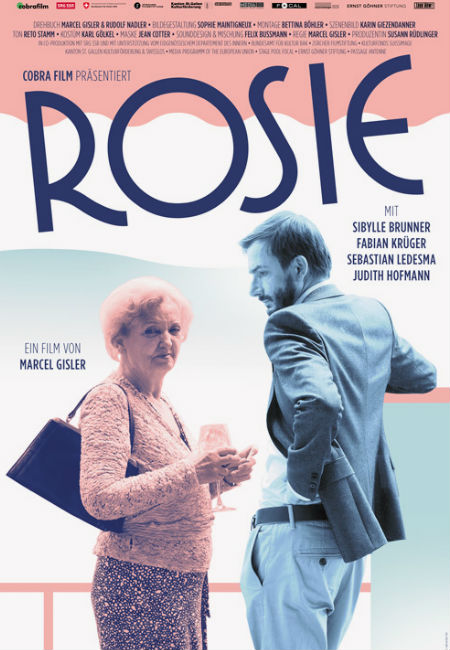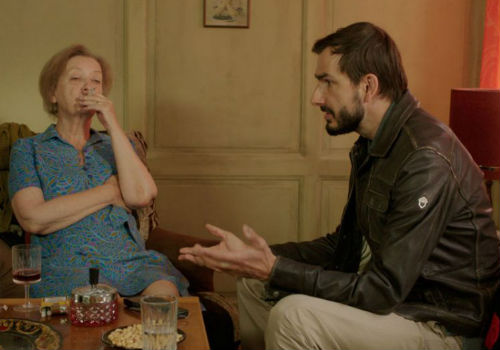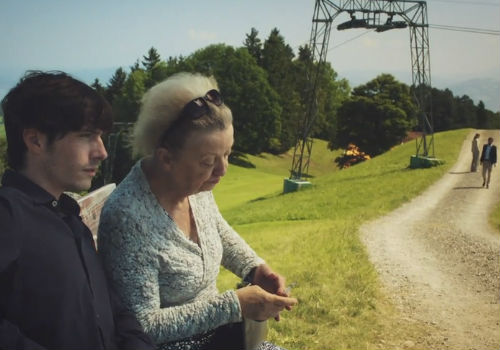
Whether we realise or not, all of us launch on this strange journey called life with expectations aplenty, which, depending on our luck or dogged persistence, will find some fulfilment or die a slow and suffocating death.
Or if you’re forty year old Lorenz Meran (Fabian Krüger), a Swiss prodigal son of sorts based in Berlin, and a semi-successful writer of gay-themed midlife crisis novels, you are stuck somewhere awkwardly in-between in Marcel Gisler’s slice-of-life drama Rosie.
This sense of limbo is not simply an existential one, extending to the frequent and somewhat reluctant trips back to his long departed hometown of Altstätten which are triggered by a minor stroke suffered by his free spirited alcoholic mother Rosie (Sibylle Brunner) minor stroke who finds herself under the unwelcome spotlight care of Fabian and his disaffected sister Sophie (Judith Hofmann).
While all three obviously hold some affection for each other, the relationships are either limp with disuse (Fabian and Sophie), dripping with latent or outright expressed hostility (Rosie and Sophie) or sentimentally but not practically close (Fabian and Rosie), and everyone circles warily around each other, none of them happy about the sudden turn of events.
Rosie particularly resents the idea that her freewheeling alcoholic binges and chain smoking while watching operas on TV might come under scrutiny, doing her best as her minor stroke begets a sprained ankle, and finally a heart attack which brings with it the prospect of being placed in a home, to keep things exactly as they are.

The reality is though that she has reached the point where her body is not keeping pace with her irascible spirit, and change will have to come, sooner rather than later.
Rosie of course is having none of this, and fights tooth and nail, including unhelpfully with her in-home nursing carers, to put off the day of reckoning as long as possible.
But she is not the only one fighting back against life events that aren’t quite matching expectations.
Fabian finds himself attracting the attention of Mario (Sebastian Ledesma), a young man barely out of university who has returned home to care for his ageing grandparents, and while flattered and receptive at first, finds himself pushing back, superficially suspicious of Mario’s motivations for pursuing the relationship, but deep down afraid of what it will be like to actually let someone properly into his life.
Sophie too is struggling with a marriage that barely sputters along, plagued as it is by her husband’s ambivalent love and constant infidelity,and her own inability to work out what it is she wants from it.
All of them are struggling to work out what comes next and Gisler, who directed and co-wrote the film with Rudolf Nadler, does a fine job of illustrating how impotent and frustrated Rosie and her family are in the face of situations that simply won’t follow the vague script they have in mind.
The problem underlying all this dislocation, of course, is that none of them really know each other.

It takes the revelation of a long held family secret for any sort of meaningful bonds to re-emerge between the three family members and then between Fabian and Mario, bonds which thanks to the nuanced screenplay aren’t portrayed in Hallmark-like warm and fuzzy moments or sepia tones of familial bliss but rather one which retain an air of flawed authenticity even as the four central characters grow meaningfully closer.
Rosie especially, free of the secret that she has long held close to her, isn’t suddenly transformed into a woman of overpowering good character and virtue, retaining her impish irascibility all the way through, which thanks to Sibylle Turner’s finely tuned performance, never renders as an unlikable caricature.
Nor does Fabian transform into the perfect son, Mario into the obvious long term lover or Sophie the domestically blissful housefrau.
All of them stayed gloriously, realistically flawed, even as things improve between them, and it’s a tribute to Gisler that Rosie, his first film set in his native Switzerland after years of working almost exclusively in Berlin, retains a sense of being about real people in real trying situations doing their best to find a way past their long held expectations to the lives that actually made some sort of sense
They may not be perfect, and they may not meet long held expectations but they may just be better than what they had, or at least in the case of Rosie whose life doesn’t play out even close to what she wanted, at least a little burdensome and soul-crushing as the old.
What makes Rosie such a rewarding viewing experience is that Gisler doesn’t attempt to supply all the answers or pretend there is a happily ever after, just a better than it was before perhaps, and in the end, though it may confound our expectations, that is pretty all we can ask of life.